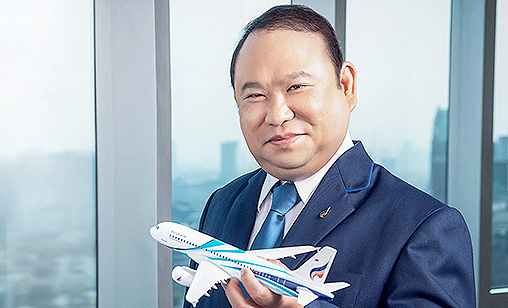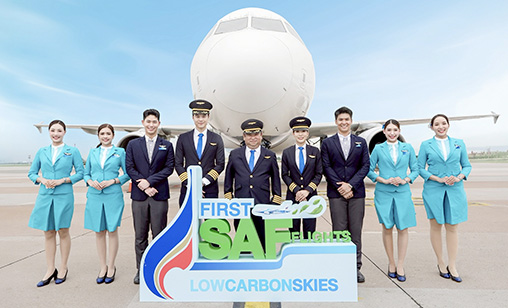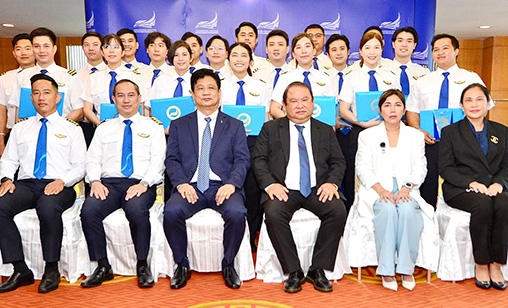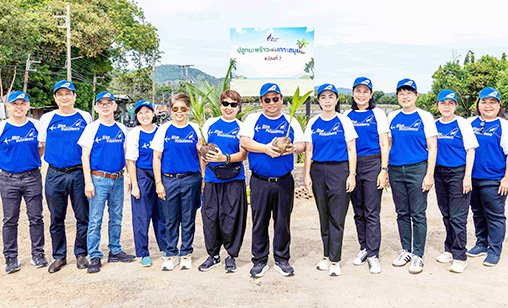Cover Story
Basking in the glow of The White Lotus phenomenon
It is known as Asia’s boutique airline; its business built on air traffic to Thailand’s famed beach resorts. With solid financial performances and “The White Lotus” affect boosting traffic, Bangkok Airways is preparing for fleet renewal and network expansion. Associate editor and chief correspondent, Tom Ballntyne, reports.
October 1st 2025
It’s not often an airline’s growth prospects are boosted by a television series. Read More » But in the case of Bangkok Airways (BKK) that is exactly what is happening. The White Lotus is an American TV drama and a global smash hit. Along with other international destinations featured in some episodes of the series two have been set in two of Thailand’s most popular resorts: Koh Samui and Phuket.
Thailand, a leading tourist destination in Southeast Asia, forecasts a record 40 million visitors this year driven in part by the global success of the White Lotus. Already its fans have fuelled a surge in luxury bookings in top destinations in Phuket, Bangkok and Samui. The trend is expected to boost visitor spending in Thailand by 10%-15%, up from 7% last year, and driving accommodation prices higher by 40%.
 |
All of this is great news for Bangkok Airways (BKK), which this year is hosting the Assembly of Presidents of the Association of Asia Pacific Airlines (AAPA) in mid-November in Bangkok, as BKK owns Samui airport – and two others in Thailand – so flying passengers to and from the country’s famous beach resorts is the mainstay of its business.
It has code-share agreements with some 30 international airlines that fly into Bangkok and pass on their passengers to BKK for transit to resorts across the country.
With prospects bright, the airline is looking to renew its aging fleet. BKK president and CEO, Puttipong Prasarttong-Osoth, has said the carrier is looking at acquiring 20 single-aisles with options for another 10 jets. It has been in discussions with Airbus, Boeing and Embraer, but is yet to announce any firm orders.
BKK operates 25 aircraft with an average age of 15.1 years: 12 A319-100s, three A320-100s and 10 ATR 72-600s.
“Regarding fleet, we are modernizing and right-sizing it. We have publicly stated plans for fleet renewal and potential additions of more aircraft over a multi-year horizon, while taking a measured approach to near-term acquisitions given market uncertainty,” he told Orient Aviation.
“We expect to operate in the mid-20s aircraft range through 2025-2026 as we balance renewal with operational stability.”
He added the airline’s core network will remain focused on Asia and its resort hubs where BKK has a strong market position, including Samui and key domestic routes.
“We continue to evaluate selective network additions that fit our boutique full-service model and where we can deliver a profitable, differentiated product, he said.”
 |
Puttipong said overall demand for air travel across the region has recovered steadily in all segments since the pandemic ended: either it be domestic travel, international travel, corporate or leisure travel and especially leisure destinations as people are looking for not just vacations but “work-cation” in remote areas rich in cultures and with a relaxing atmosphere, locations Thailand has in abundance.
“For Bangkok Airways, our uniqueness is a boutique, full-service product focusing on passenger experiences beyond regular services,” he said.
“Our airline focuses on regional destinations within and around Thailand. We continue to prioritize steady, profitable growth rather than rapid expansion, matching capacity to demand on our key routes to keep load factors high and yields stable.
“Our core network will remain focused on Asia and our airport hubs of Samui, Sukhothai and Trat as well as key main destinations popular with both domestic and international travellers particularly like Phuket, Chiang Mai, Siem Reap and Laung Prabang where we have a strong market position.
“We continue to evaluate selective network additions that serve the outlook of our customers and fit our boutique full-service model. It is where we can deliver a differentiated product.”
Post the gloom of the pandemic, BKK’s financial performance has been strong. In 2023, as the industry continued to recover from the impact of COVID, BKK reported an operating profit of US$93.2 million with revenue rising 70.06% to $665.11 million. It has reported a net profit of $52 million for the first quarter of this year despite a marginal 1.4% decline in revenue.
The result reflected the carrier’s strategic cost management in a competitive Southeast Asia market. In the three months, BKK flew 1.28 million passengers.
 |
In the second quarter of the year, profits did drop, by 43.59% to $12.37 million, with a 1.1% decrease in revenue to $177 million.
It was a result of average fares softening by 2.6%, an increase in expenses of 3.5% and the addition of higher personnel costs and foreign exchange losses.
Like all airlines, BKK is conscious of ongoing supply chain pressures across the aerospace sector. “Manufacturers and suppliers have experienced delivery and parts constraints, which has extended lead times industry wide,” he said.
“We are managing this conservatively with a mix of owned, leased, and temporary wet-lease solutions where needed and by planning fleet decisions with realistic delivery timetables.
“In short, the global supply environment is a constraint, but we have taken steps to mitigate operational risk and maintain service for passengers.”
BKK also has been able to meet the challenge of talent supply, an industry-wide issue as airlines rebuild capacity.
“At Bangkok Airways, we actively recruit and retain cockpit and technical crew through competitive training programs, retention packages and partnerships with global training providers,” Puttipong said.
“Moreover, we had a comprehensive strategy in place during COVID to retain experienced staff in critical areas of the company, allowing us to resume operations smoothly and avoid shortfalls. We have been seeing the benefits of this strategy up to now. Importantly, we operate our own Bangkok Airways Training Center (BATC). It plays a key role in developing and upskilling our pilots, engineers and cabin crew to meet current and future operational needs.”
BATC reinforces a long-term strategy of building self-reliance in training, ensuring BKK can grow sustainably without being overly dependent on external pipelines, he explained. “In addition, we make tactical use of wet-leases or short-term leasing to cover peak periods when required,” he said.
 |
| The Bangkok Airways Blue Volunteers are part of the airline's corporate sustainability initiatives. They participate in various environmental conservation efforts, such as planting coconut seedlings and releasing juvenile blue swimming crabs to promote marine conservation. Recently, they also contributed to the "Love Earth, Save Earth" campaign, which aims to plant coconut trees and raise awareness about carbon dioxide absorption. |
“At present, our staffing levels allow us to operate our network reliably, but we remain vigilant, especially as the wider region is experiencing increasing pilot demand as airlines expand fleets.”
One key focus has been on sustainability and Puttipong has implemented sustainable practices including reducing carbon emissions, investing in eco-friendly initiatives and promoting responsible tourism in the regions it serves.
One of the key impacts of his leadership is his emphasis on sustainable practices. BKK, under his direction, is a pioneer in implementing eco-friendly initiatives to reduce its carbon footprint and promote environmental responsibility within the aviation sector.
“The aviation industry continues to navigate multiple challenges, from economic volatility and fluctuating fuel prices to shifting travel patterns and geopolitical uncertainties,” he said.
“For Bangkok Airways, maintaining operational resilience while adapting to these evolving dynamics remains a key focus.
“Another major challenge is global warming and climate change. As an industry, we must address our environmental impact responsibly. At Bangkok Airways, ESG development is a core strategic priority in the years ahead.
“We are fully aligned with IATA’s commitment to achieving net zero carbon emissions by 2050.
“To move toward this goal, we have initiated several sustainability programs, including the initial implementation of Sustainable Aviation Fuel (SAF) usage on our commercial flights, our One Engine Taxi campaign to reduce CO₂ emissions and continuous energy-efficiency improvements across operations.
“Beyond environmental measures, our ESG focus extends to social and community development. We actively support local communities near our airports with a variety of projects that promote education, cultural preservation and economic self-sufficiency.
“In short, the path ahead will require innovation, collaboration, and commitment, but we see these challenges as opportunities to strengthen our long-term sustainability and to continue being a responsible, forward-looking airline.”
In July this year BKK announced it was continuing to drive its “Low Carbon Skies by Bangkok Airways” campaign, aiming to reduce carbon dioxide emissions.
 |
The airline officially announced the adoption of SAF on its commercial flights, reinforcing Thailand’s green aviation industry and laying a crucial foundation for environmentally balanced aviation development in the future.
In 2024, the airline began using SAF on a pilot flight operating between Samui and Bangkok. This time, SAF will be used on commercial flights departing from Bangkok (Suvarnabhumi Airport) to international destinations including Phnom Penh, Siem Reap, Luang Prabang and the Maldives.
BKK started life in 1968 as Sahakol Air, operating air taxi services under contract to a number of organizations engaged in oil and gas exploration in the Gulf of Thailand.
It began scheduled services in 1986, becoming Thailand’s first privately owned domestic airline. It rebranded as Bangkok Airways in 1989.
Its first foray into jet aircraft operations was in 2000 with a B717. It now operates scheduled services to destinations in Thailand, Cambodia, China, Hong Kong, Laos, Maldives and Singapore with its main base at Bangkok’s Suvarnabhumi Airport.
The airline is majority-owned by Puttipong’s father, Prasert Prasarttong-Osoth, a former surgeon and Thai billionaire who also co-founded Bangkok Dusit Medical Services in 1972, Thailand’s largest private hospital operator. He took BKK public in 2014.
In the early 2000s, BKK considered an ambitious plan to expand its fleet by entering long-haul markets, looking at adding wide-body A330s, A340s or 787 to its fleet.
In December 2005 it announced it had decided to negotiate an order for six A350-800s to be delivered to the airline from 2013, but the order was cancelled in 2011 due to delivery delays.
Puttipong’s approach emphasizes collaboration, transparency and a relentless pursuit of excellence. His academic achievements include a Bachelor’s Degree from the Faculty of Commerce and Accountancy and a Diploma from the Senior Executive Program, Sasin Graduate Institute of Business Administration from Thailand’s most prestigious university.
One key aspect of his leadership style is his focus on customer-centricity, believing putting customers at the centre of every decision is crucial for long-term success.
As for the future, Puttipong is confident the airline will continue to thrive. “Bangkok Airways remains committed to delivering the warm, dependable full-service experience that defines our brand as “Asia’s Boutique Airline!” “While we are realistic about industry headwinds, we see strong opportunities in regional leisure travel and we will continue to invest prudently in fleet renewal, crew development, sustainability and product improvements that matter to our guests.”
selina says:
January 30th 2026 03:13am